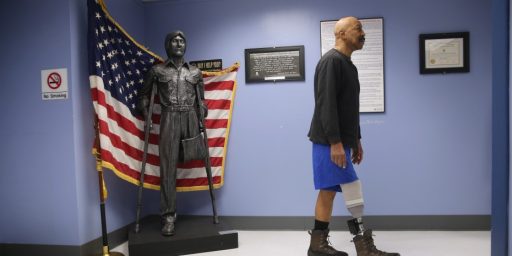Wounded Vets in Demand
WaPo’s Ellen McCarthy (who I met when she interviewed me for a piece on DC area bloggers a year ago) has an interesting story on the front of the Business section:
Through broad initiatives and individual requests, corporations have been actively recruiting veterans of the Iraq and Afghanistan conflicts, turning military hospitals like Walter Reed into de facto hiring centers. Job offers aren’t being handed out carte blanche, and companies say talent and fit are still the main priorities. But executives seeking out wounded soldiers claim that many of the skills acquired in the military are applicable in the private sector — particularly within companies that serve the government. A soldier who has led a platoon into war is probably capable of leading a unit at a private company, executives say. With government contracting in the midst of a boom, the security clearances and knowledge that soldiers bring home with them are also highly valued.
“They’ve got to be able to talk the language. And you can’t teach a person that language, it’s a language you can only learn by being part of that culture,” said Paul Evancoe, director of military operations at FNH USA Inc., a McLean weapons manufacturer with about 350 employees in the United States and 16 in the Washington area. The company is among those interested in hiring Moore.
The quest to seek an injured vet was both company-driven and personal, said Evancoe, who received a Purple Heart after being shot in Vietnam. Many FNH employees are veterans, so the company’s atmosphere and values largely mirror that of the military, he added. “If you take a guy and immerse him back into that culture . . . it’s going to be very positive. It’s going to help the healing,” Evancoe said. “It’s not like I can hire every single guy, but when I have a job, I’m going to search out a veteran.”
It’s a good policy all around. Certainly, no one deserves a break more than a veteran who lost a limb fighting for his country.
The passage above also highlights an issue I’ve discussed before (here and here, especially): The revolving door culture created by government security clearances. Those with an existing clearance, especially a TOP SECRET, have a huge advantage in getting a whole variety of jobs compared to those without.





Re clearances. But it’s also a trap for those that have clearances, albeit a pretty good trap. People with clearances are loath to take a job that doesn’t require a high level clearance since that will mean a loss of access and then potential future employability. It more resembles a closed union shop for a hiring pool.
I got out of that pot as soon as I retired. While government or government-related jobs that require clearances pay better than ones that don’t, there are still plenty of jobs out there that pay at least as well, and don’t require a clearance.
When I retired from the Navy, I’d had my fill of working for the government. While I continued to work for a non-military branch of government through my employer, I left that job as soon as feasible and haven’t worked for the government since, directly or indirectly.
Well, other than the work I have to do to pay my taxes, of course. I haven’t figured my way around that one yet.